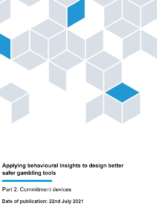Key findings
- For every £1 spent on gambling in the UK, ~40 pence is spent online. 💸 Growth has accelerated during the COVID-19 pandemic, and regular gamblers were 6x more likely to gamble online, compared to before the pandemic. Tweet
- Our latest work shows that commitment device interventions may not be well-suited to online deposit limit tools, with fewer people setting limits (though some indication of lower limits being set). 🎰 Tweet
Our latest report continues BIT’s extensive work on investigating whether industry-standard safer gambling tools can be improved using principles from behavioural science. As with our report earlier in 2021, our latest work again focused on deposit limits: a widely-available tool that allows people who gamble to cap the amount they can deposit into their online gambling account.
Here, our trial involved building in additional functionality to deposit limit tools whereby some customers could opt to also indicate a reason as to why they were setting a limit, for example. These customers then received periodic reminders of their chosen reason.
Compared to customers who saw the industry-standard deposit limit tool, our trial found that customers in our treatment groups were less likely to set limits. Treatment group customers did, however, tend to set lower average limits.
Overall, our trial suggests that this particular kind of intervention is likely not well-suited to improving how deposit limit tools work.





